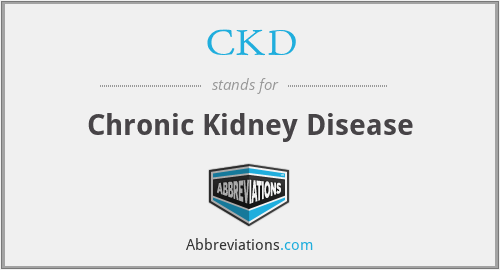What does CKD mean in Physiology?
This page is about the meanings of the acronym/abbreviation/shorthand CKD in the Medical field in general and in the Physiology terminology in particular.
Chronic Kidney Disease
Translation
Find a translation for Chronic Kidney Disease in other languages:
Select another language:
- - Select -
- 简体中文 (Chinese - Simplified)
- 繁體中文 (Chinese - Traditional)
- Español (Spanish)
- Esperanto (Esperanto)
- 日本語 (Japanese)
- Português (Portuguese)
- Deutsch (German)
- العربية (Arabic)
- Français (French)
- Русский (Russian)
- ಕನ್ನಡ (Kannada)
- 한국어 (Korean)
- עברית (Hebrew)
- Gaeilge (Irish)
- Українська (Ukrainian)
- اردو (Urdu)
- Magyar (Hungarian)
- मानक हिन्दी (Hindi)
- Indonesia (Indonesian)
- Italiano (Italian)
- தமிழ் (Tamil)
- Türkçe (Turkish)
- తెలుగు (Telugu)
- ภาษาไทย (Thai)
- Tiếng Việt (Vietnamese)
- Čeština (Czech)
- Polski (Polish)
- Bahasa Indonesia (Indonesian)
- Românește (Romanian)
- Nederlands (Dutch)
- Ελληνικά (Greek)
- Latinum (Latin)
- Svenska (Swedish)
- Dansk (Danish)
- Suomi (Finnish)
- فارسی (Persian)
- ייִדיש (Yiddish)
- հայերեն (Armenian)
- Norsk (Norwegian)
- English (English)
Definition
What does CKD mean?
- Chronic kidney disease
- Chronic kidney disease (CKD) is a type of kidney disease in which there is gradual loss of kidney function over a period of months or years. Early on there are typically no symptoms. Later, leg swelling, feeling tired, vomiting, loss of appetite, or confusion may develop. Complications may include heart disease, high blood pressure, bone disease, or anemia.Causes of chronic kidney disease include diabetes, high blood pressure, glomerulonephritis, and polycystic kidney disease. Risk factors include a family history of the condition. Diagnosis is generally by blood tests to measure the glomerular filtration rate and urine tests to measure albumin. Further tests such as an ultrasound or kidney biopsy may be done to determine the underlying cause. A number of different classification systems exist.Screening at-risk people is recommended. Initial treatments may include medications to manage blood pressure, blood sugar, and lower cholesterol. NSAIDs should be avoided. Other recommended measures include staying active and certain dietary changes. Severe disease may require hemodialysis, peritoneal dialysis, or a kidney transplant. Treatments for anemia and bone disease may also be required.Chronic kidney disease affected 753 million people globally in 2016, including 417 million females and 336 million males. In 2015 it resulted in 1.2 million deaths, up from 409,000 in 1990. The causes that contribute to the greatest number of deaths are high blood pressure at 550,000, followed by diabetes at 418,000, and glomerulonephritis at 238,000.
Popularity rank by frequency of use
How popular is CKD among other acronyms?
CKD#1#5807#12977
Embed
Citation
Use the citation below to add this abbreviation to your bibliography:
Style:MLAChicagoAPA
"CKD." Abbreviations.com. STANDS4 LLC, 2024. Web. 18 Apr. 2024. <https://www.abbreviations.com/term/293166>.



Discuss this CKD abbreviation with the community:
Report Comment
We're doing our best to make sure our content is useful, accurate and safe.
If by any chance you spot an inappropriate comment while navigating through our website please use this form to let us know, and we'll take care of it shortly.
Attachment
You need to be logged in to favorite.
Log In